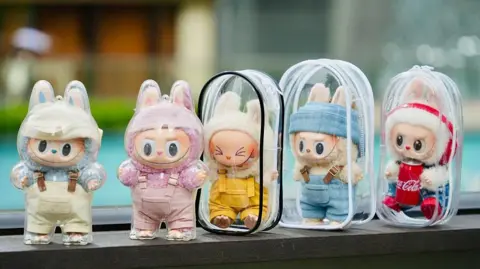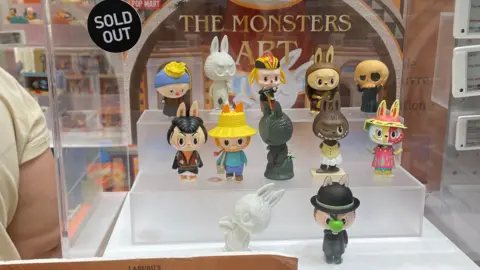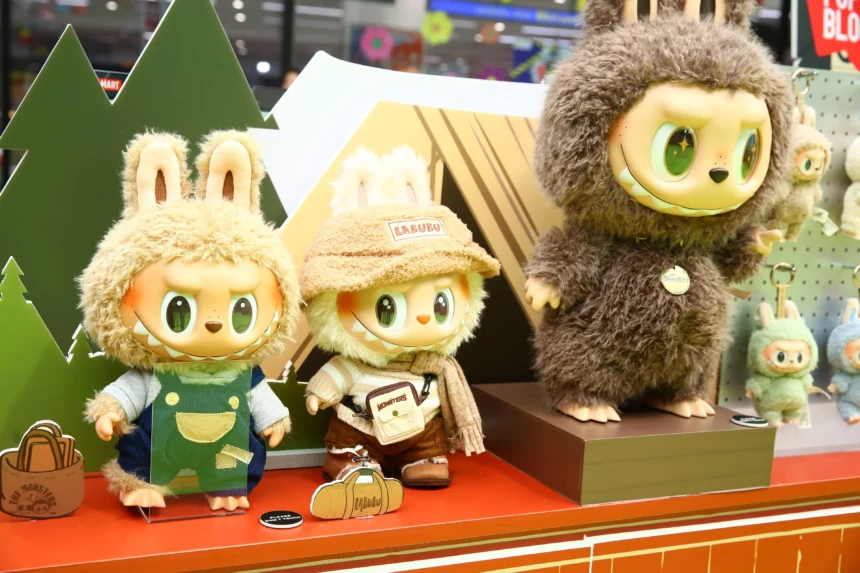Introduction
Labubu dolls — are they adorable or just weird? What started as a quirky Chinese collectible has exploded into a global sensation, winning over celebrities, collectors, and casual buyers alike. The furry, elfin creatures from Pop Mart are now central to one of the most remarkable viral toy trends of the decade, fueling booming sales and elevating China’s cultural influence on the world stage.
What Is Labubu?

Labubu is both a character and a brand created by Hong Kong-born artist Kasing Lung as part of “The Monsters” series. The doll features vinyl heads attached to plush bodies, with pointy ears, wide eyes, and a mischievous grin showing exactly nine teeth. According to Pop Mart, Labubu is “kind-hearted and always wants to help, but often accidentally achieves the opposite.”
The Labubu universe also includes characters like Zimomo, Tycoco, and Mokoko, who have spawned their own collectible figures. While some people find them irresistibly cute, others are baffled by their quirky appearance. This divisive charm only adds to Labubu’s viral appeal.
The Pop Mart Phenomenon
Pop Mart, founded in 2010 in Beijing, initially operated as a variety store. Its breakthrough came with the introduction of “blind boxes”—sealed packages where buyers don’t know which figure they’re getting until they open the box. After early success with Molly dolls, Pop Mart partnered with Kasing Lung in 2019 to release the first Labubu series. The rest is history.
Pop Mart’s IPO on the Hong Kong Stock Exchange in 2020 marked its transformation into a global collectible powerhouse. The company’s shares have surged over 500% in the past year, thanks in large part to Labubu’s growing international fanbase. As of 2024, nearly 40% of Pop Mart’s revenue comes from overseas sales, with stores and vending “roboshops” in over 30 countries including the US, UK, Singapore, and Australia.
Celebrity Hype and Global Spread

Labubu’s global breakout began post-pandemic as people sought comfort in chaotic, imperfect characters like Labubu. The viral trend accelerated in April 2024 when Blackpink’s Lisa posted pictures with Labubu dolls on Instagram. Soon after, Rihanna, Kim Kardashian, and even David Beckham showcased their Labubu collections on social media, fueling international demand.
Today, queues for new Labubu releases regularly go viral, sometimes leading to heated disputes among buyers. Chinese customs officials have even seized over 70,000 counterfeit Labubu dolls in recent crackdowns, highlighting the frenzy.
Blind Box Culture and Collector Craze
A big part of Labubu’s allure lies in its blind box sales model. Collectors often try to guess which variant they’re buying by shaking the boxes. Desmond Tan, a seasoned collector in Singapore, says getting a rare “chaser” edition — which appears roughly one in every 100 boxes — brings immense satisfaction. “Learning how to feel the difference… if I can get it in just one or two tries, I’m very happy!” Tan says.
Original Labubu dolls typically sell for $18 to $70, making them accessible to most consumers. However, rare editions can fetch far higher prices on secondary markets, fueling the collector culture further.
Labubu and China’s Soft Power

Beijing has embraced Labubu’s success as a shining example of “cool China.” State-run Xinhua News praises the brand’s global appeal as proof of Chinese creativity reaching international audiences. Alongside video games like Black Myth: Wukong and films like Nezha, Labubu demonstrates China’s growing cultural export power despite Western political skepticism.
“They’re so good that no one cares they’re from China,” says Chris Pereira of consultancy firm iMpact, noting that Chinese brands like BYD and DeepSeek follow similar trajectories of global acceptance.
Conclusion
Labubu dolls have turned into a viral global phenomenon driven by perfect timing, internet randomness, and celebrity endorsements. Whether you find them cute, creepy, or just oddly endearing, their rapid rise reflects not only shifting consumer trends but also China’s growing presence in global cultural markets. As millions continue to unbox, collect, and trade Labubu, one thing is clear: the craze shows no sign of slowing down.
Stay updated with more global business trends here.
For further reading, check out:
- BBC – How Labubu dolls conquered the world
- The Morning News Informer – Global Viral Trends
- Reuters – Pop Mart soars as Labubu goes global
Call to Action
Are you part of the Labubu craze? Share your collection and thoughts in the comments! Follow us for more insights on global viral trends and business phenomena.









